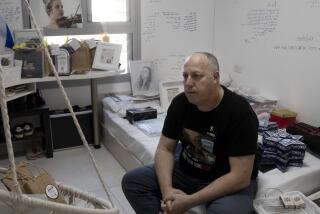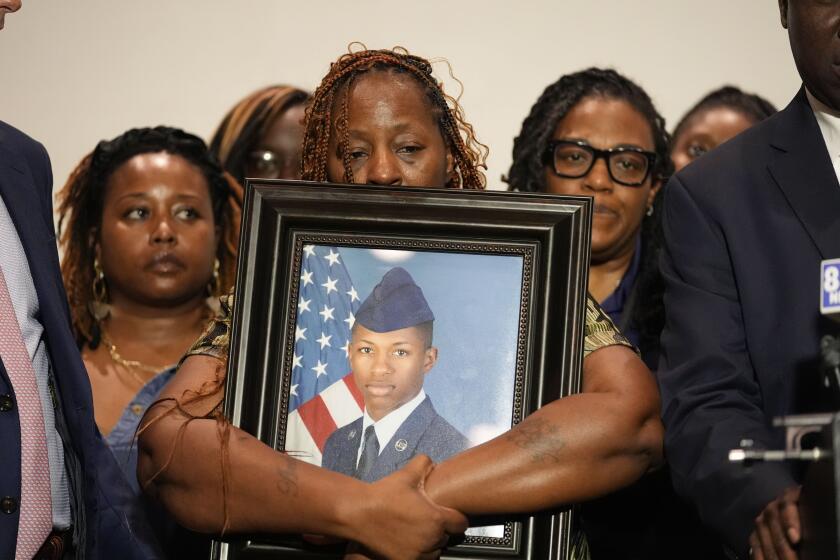Ex-Hostages Taste--and Drink--Freedom : Aftermath: Anderson, Steen and Cicippio savor simple joys with their families.
Thursday may have dawned dull and gray in this old German spa town, but for newly released hostage Terry A. Anderson, it was the start of a sweet new life--his first full day of freedom in more than 6 1/2 years.
In an atmosphere filled with relief and celebration, the families of the last three American hostages to be freed in the Mideast tasted the simplest of joys that no money can buy.
Anderson, for example, sat down to breakfast for the first time with his 6-year-old daughter, Sulome, and watched her down a plate of pancakes and milk.
The 44-year-old journalist hugged his sister, Peggy Say, the quiet woman whose sheer tenacity kept the hostage issue in the public eye long after many simply wanted to forget.
Alann Steen, reveling in his second full day of freedom in nearly five years, woke up at 3 a.m. to munch Hydrox cookies and drink milk with his wife, Virginia, at his side.
For Joseph J. Cicippio, freed Monday after more than five years as a prisoner, the day marked the start of his journey back home to Norristown, Pa., safe in the hands of his wife and family.
In their own way, the simple, everyday events in the medical center contained an important, larger message: One of America’s longest, most frustrating crises was finally over. For the first time since the mid-1980s, no family in the United States had to wear yellow ribbons for a loved one trapped in the Middle East.
At a news conference, Steen’s wife described what she called “a wonderful day for all of us.”
“To be able to sit there--three families that have worked so much together, who are so close--and actually have them watch the final one (hostage) walk in was really, really a special moment,” she said. “I’ll never forget it.”
Cicippio and Steen greeted Anderson briefly. Then, the three appeared together on an upper hospital balcony to wave to reporters and the small crowd that had braved a chilly, pre-dawn drizzle to welcome them.
An initial medical report on Anderson issued late Thursday showed that he appeared to have survived his imprisonment in far better shape than the two other men despite spending longer in captivity.
The report, released by the hospital’s public affairs office, said Anderson suffers from a sinus infection and a mild form of pleurisy, a lung inflammation. Both conditions should be cleared up within several weeks, according to the medical report. Aside from the need for dental work and a pain in his left knee resulting from an injury initially sustained in his early 20s, Anderson was given a clean bill of health.
“Mr. Anderson told his doctors he feels good, enjoys being with his loved ones and is looking forward to his future,” the report stated.
In Bonn, meanwhile, German Foreign Minister Hans-Dietrich Genscher voiced cautious optimism that two remaining Western hostages held in Lebanon--both German nationals--might soon be free.
After meeting in Bonn with United Nations mediator Giandomenico Picco, Genscher said there is “cause for confidence in a quick solution” that would bring the release of aid workers Heinrich Struebig, 50, and Thomas Kemptner, 30, both kidnaped in May, 1989. A third kidnaped Westerner, Italian Alberto Molinari, has been reported dead by Shiite Muslim sources in Beirut.
Imprisonment left both Cicippio and Steen with permanent scars. Cicippio suffered frostbite on his fingers and toes after being chained on a partially exposed balcony during two winters. Steen incurred a brain lesion after he was kicked and knocked to the ground by one of his guards.
During a brief meeting with reporters, Steen said he fell first against a wooden chair, then onto a concrete floor after being kicked hard in the diaphragm by a guard who apparently decided he was not taking an exercise period of deep knee bends seriously enough.
Clearly upset at news reports noting the brain lesion, Steen’s wife tried to soothe worried friends and relatives in the United States.
“A blow to the head does not mean that severe damage has occurred,” she said. “Yes, he does have a lesion. Yes, he will be on medication, (but) he’ll lead a wonderful life.”
Steen said he had both good and bad guards during his imprisonment and little sympathy toward either.
“The bad ones I feel some animosity toward. The good ones I feel nothing for,” he said. “They took five years out of my life. I think, unfortunately, they’ll get away with it.”
More to Read
Start your day right
Sign up for Essential California for news, features and recommendations from the L.A. Times and beyond in your inbox six days a week.
You may occasionally receive promotional content from the Los Angeles Times.






